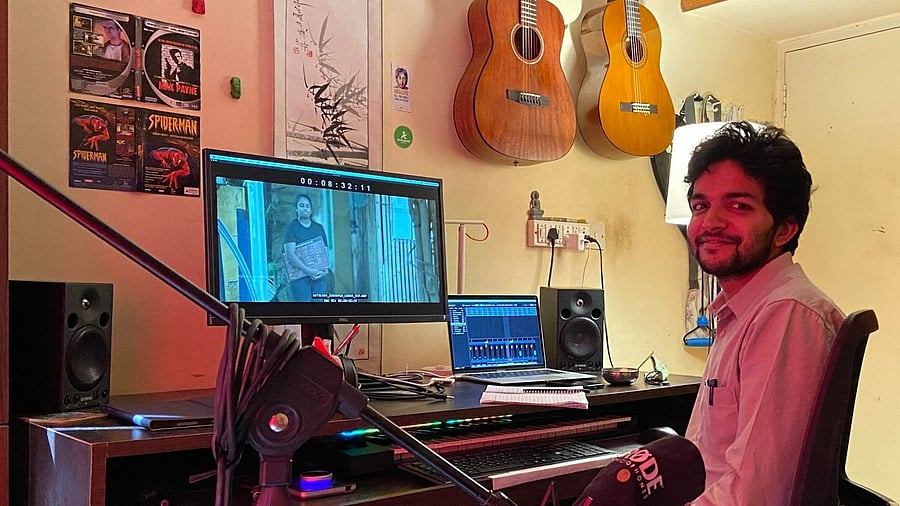
Credit: Special Arrangement
The music of the recently released Kannada film ‘Kenda’ by first-time music composer Ritwik Kaikini is getting noticed for its rock and jazz styles which are rare in Kannada cinema.
Ritwik’s musical journey began in his childhood, when his parents got him cassettes of The Beatles, Elvis Presley, Talat Mahmood, Mehdi Hasan and Ace of Base among others. He was instantly hooked to listening to a variety of genres, from soft-rock to classical and electronic. “The chord progressions of ‘The Beatles’ and the simplicity of their songwriting, particularly, made a huge impression on me,” he says. Ritwik started learning guitar in 2010 from Bengaluru-based guitarist-composer Hamid Hasan. “He drew me into the world of dedicated practice, critical listening and music appreciation. He also introduced me to different styles of music including flamenco and classical guitar,” says the 32-year-old music composer who also did a film appreciation course from FTII, Pune.
With an MA in Arts and Technology and a specialisation in the field of philosophy of sound, he assisted music director Charan Raj and learnt the basics of music production.
Excerpts from an interview with Ritwik.
What was it like to work on ‘Kenda’?
It was a refreshing and rewarding experience working as a music director for the film. Roopa Rao (director of ‘Gantumoote’) and Sahadev Kelvadi, the film’s director, had heard some of my songs covers and tunes on YouTube. They contacted me and Sahadev narrated the script. I liked the honest narrative and took up the project instantly. His style of writing is experiential, satirical and brutally honest with a focus on detailed character studies. We gelled well on our approach to cinema and storytelling and developed a rapport by regularly exchanging ideas. I liked Sahadev’s honest feedback. I also visited the set during the shoot, to get a feel of the film’s environment.
What genres did you explore and why?
Many film teams edit their scenes using reference music. Music directors then imitate a style of the reference music to suit the rhythm of the scenes. However, in ‘Kenda’, I worked on every scene without a reference and decided to create my own palette of instrumentation to suit the characters and narrative.
The background score has a mix of different genres like rock, electronic and classical. The score has orchestral elements to it, along with minimal blues/jazz arrangements using bass, drums, guitar and piano. I also composed and produced an entire theme on the classical guitar and it comes at a crucial point in the film. The variety of genres covered in the score suited the minimalistic yet dynamic style of narrative that Sahadev was looking for.
How was the process of composing background music?
Composing background score for a film is also like directing a film. A lot of our attention can be steered purely through minimal musical cues when watching a film. There are different artefacts in a film that can inspire new ideas, be it characters, situations or environments. In ‘Kenda’, one of my main inspirations was the main character Keshava, played by B V Bharath. Bharath carried the character so strongly that it became a highly educational process to be able to translate and support his presence on screen musically. Background score is also challenging because of the presence of dialogue and conversation. As David Chase puts it, ‘Any music in a scene always makes a comment’. We must be careful not to drive the audience’s attention away from the dialogue while weaving the conversation together.
And the songs?
Composing songs for the film was an equally exciting process. There are three songs in the film. Two are situational songs and the other one is the title track. Charan Raj sang the acoustic soft-rock based road song ‘Dhoolu’, which was written by my father, Jayant Kaikini. Charan’s vocal texture suited the situation of the film. The other song ‘Taaja suddi’, an electronic-neo-soul pop song sung by classical singer Ananya Bhagath, is a satirical song on the hyper information era where news channels hunt for the most ‘trending’ news. Ananya’s robust voice is strikingly melodious yet aggressive, suiting the aesthetic of the song. ‘Embers’ is the title track, a rap song written and sung by me, with Adithi Sagar on the chorus.